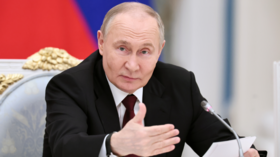International reaction: ‘West shares blame for Georgia’
While the ceasefire in South Ossetia remains in place, the blame-game battle, debating who was right and who was wrong, continues in the international media. Many say Russia has been losing the information war, but, in some quarters, it seems the view of
The British business daily the Financial Times has published a comment piece saying that the West should bear responsibility for the consequences of Georgia's attack on South Ossetia.
“Georgia will not get its separatist provinces back unless Russia collapses as a state, which is unlikely,” it says.
The newspaper adds that the populations and leaderships of these regions have repeatedly demonstrated their desire to separate from Georgia.
“Western governments should exert pressure on Georgia to accept this solution as these governments, and most especially the U.S., bear a considerable share of responsibility for the Georgian assault on South Ossetia and deserve the humiliation they are now suffering.”
Another British newspaper, The Guardian, considers the situation in Georgia's breakaway republics as being similar to that of Kosovo.
“As in the case of Yugoslavia, minorities who were happy enough to live on either side of an internal boundary that made little difference to their lives feel quite differently when they find themselves on the wrong side of an international state border.”
It also welcomes the weakened role of the U.S., accusing it of reckless expansionism.
“The war has also exposed the limits of U.S. power in the region and the return of some counterweight has to be welcome.”
The Guardian also revealed connections between Georgian president Mikheil Saakashvili and American presidential candidate John McCain, which had not been widely known.
“Saakashvili’s links with the neoconservatives in Washington are particularly close: the lobbying firm headed by U.S. Republican candidate John McCain’s top foreign policy adviser, Randy Scheumann, has been paid nearly $US 900,000 by the Georgian government since 2004.”
A third British paper, The Times, doubts that some claims made by Georgia and the West over the last week are sound or reasonable, labelling western media support to the Georgian PR machine “a confused cacophony”.











